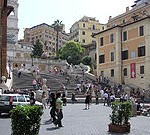Â
She dwells with Beauty – Beauty that must die;
And Joy, whose hand is ever at his lips
Bidding adieu; and aching Pleasure nigh,
Turning to poison while the bee-mouth sips:
Ay, in the very temple of Delight
Veil’d Melancholy has her sovran shrine,
Though seen of none save him whose strenuous tongue
Can burst Joy’s grape against his palate fine . . .
Â
John Keats, “Ode on Melancholyâ€
Â
It is the most anthologized poem in the language, reportedly. (Who thumbed pages and tallied that?) Ron Rosenbaum offers perennial praise to it as the “greatest lyric poem in the language.” And days like the past few make it clear why John Keats‘ “To Autumn” is my favorite poem, celebrating the fullness of fall and accepting the deliquescence of the all-in-all that follows.
Â
 I think of Malcolm Lowry’s strange story “Strange Comforts Afforded by the Profession.” Lowry’s alter ego, Sijborn Wilderness, steps into the house in Rome where John Keats spent his last weeks before dying at the age of 26 in 1821. (It is the building, now a museum, to the right of the Spanish Steps.) The time of Lowry’s story is shortly after World War II, and Wilderness wonders at Keats’ suffering for his art, but against the broader background of Europe’s 20th century cauldron – the war and the Holocaust.
I think of Malcolm Lowry’s strange story “Strange Comforts Afforded by the Profession.” Lowry’s alter ego, Sijborn Wilderness, steps into the house in Rome where John Keats spent his last weeks before dying at the age of 26 in 1821. (It is the building, now a museum, to the right of the Spanish Steps.) The time of Lowry’s story is shortly after World War II, and Wilderness wonders at Keats’ suffering for his art, but against the broader background of Europe’s 20th century cauldron – the war and the Holocaust.
Â
 Keats was beginning to sense his own mortality when he wrote “To Autumn” in 1819, inspired by what he saw during an early fall walk, but seeing in it the very end of his own season. I’ve been reading Stanley Plumly’s beautiful new book, Posthumous Keats, which plays on the despair Keats felt for his own “posthumous” obscurity while still alive–at his request his epitaph reads “Here lies One Whose Name was writ in Water”–and the bittersweet irony of his living-in-language after death, his real posthumous immortality. As immortal as it gets in our headlong fall!
Keats was beginning to sense his own mortality when he wrote “To Autumn” in 1819, inspired by what he saw during an early fall walk, but seeing in it the very end of his own season. I’ve been reading Stanley Plumly’s beautiful new book, Posthumous Keats, which plays on the despair Keats felt for his own “posthumous” obscurity while still alive–at his request his epitaph reads “Here lies One Whose Name was writ in Water”–and the bittersweet irony of his living-in-language after death, his real posthumous immortality. As immortal as it gets in our headlong fall!
Â
Outside this moment it is beautiful Portland weather poetry, soon to be writ in Rain. We might wonder about the chemistry of creativity and pain. Must one suffer to write the blues? Does the suffering write the blues? Is blues the suffering or its consolation? If there is consolation in philosophy, in religion, in poetry, “To Autumn” is a perfect example of it. It is, in Keats’ other famous metaphor, Joy’s grape burst against the mind’s palate. You can hear it read by Stanley Plumly and others at Atlantic Unbound Soundings. Or sound it to yourself or a friend in the soft-dying day:
Â
TO AUTUMN
Â
Season of mists and mellow fruitfulness,
Close bosom-friend of the maturing sun;
Conspiring with him how to load and bless
With fruit the vines that round the thatch-eves run;
To bend with apples the moss’d cottage-trees,
And fill all fruit with ripeness to the core;
To swell the gourd, and plump the hazel shells
With a sweet kernel; to set budding more,
And still more, later flowers for the bees,
Until they think warm days will never cease,
For Summer has o’er-brimm’d their clammy cells.Â
Who hath not seen thee oft amid thy store?
Sometimes whoever seeks abroad may find
Thee sitting careless on a granary floor,
Thy hair soft-lifted by the winnowing wind;
Or on a half-reap’d furrow sound asleep,
Drows’d with the fume of poppies, while thy hook
Spares the next swath and all its twined flowers:
And sometimes like a gleaner thou dost keep
Steady thy laden head across a brook;
Or by a cyder-press, with patient look,
Thou watchest the last oozings hours by hours.
Â
Where are the songs of Spring? Ay, where are they?
Think not of them, thou hast thy music too,—
While barred clouds bloom the soft-dying day,
And touch the stubble plains with rosy hue;
Then in a wailful choir the small gnats mourn
Among the river sallows, borne aloft
Or sinking as the light wind lives or dies;
And full-grown lambs loud bleat from hilly bourn;
Hedge-crickets sing; and now with treble soft
The red-breast whistles from a garden-croft;
And gathering swallows twitter in the skies.